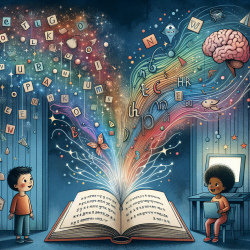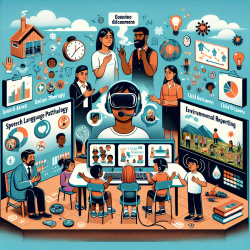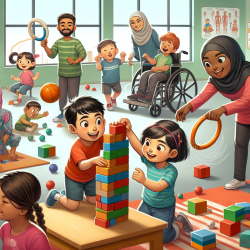Introduction
As a speech-language pathologist, understanding the complexities of word processing in the human brain is crucial for developing effective interventions for children. Recent research on the spatiotemporal dynamics of word processing provides valuable insights that can enhance our therapeutic approaches. This blog explores the findings of the study "Spatiotemporal Dynamics of Word Processing in the Human Brain" and discusses how practitioners can apply these insights to improve outcomes for children receiving online therapy services.
The Study: An Overview
The research conducted by Canolty et al. (2007) examined the spatiotemporal dynamics of word processing using electrocorticogram (ECoG) recordings from the lateral frontotemporal cortex of neurosurgical patients. The study identified a network of cortical structures involved in early word processing, highlighting the role of high gamma (HG) activity in tracking the spatiotemporal dynamics of word processing.
The study found that listening to verbs compared to nonwords sequentially activates the posterior superior temporal gyrus (post-STG), then the middle superior temporal gyrus (mid-STG), followed by the superior temporal sulcus (STS). This sequence of activation provides a detailed map of the cortical regions involved in early word processing.
Implications for Speech-Language Pathology
Understanding the neural mechanisms of word processing can inform the development of targeted interventions for children with language disorders. Here are some ways practitioners can apply these insights:
- Data-Driven Interventions: By understanding the sequence of cortical activation during word processing, practitioners can design interventions that target specific brain regions and processes, potentially leading to more effective outcomes.
- Personalized Therapy: The study's findings suggest that different brain regions are activated at different times during word processing. This knowledge can help practitioners tailor interventions to the individual needs of each child, focusing on the specific areas where they may need the most support.
- Enhanced Assessment Techniques: The insights from the study can also inform assessment techniques, helping practitioners identify which aspects of word processing may be challenging for a child and adjust their therapeutic approach accordingly.
Encouraging Further Research
While the study provides valuable insights, it also highlights the need for further research to fully understand the complexities of word processing. Practitioners are encouraged to stay informed about ongoing research in this area and consider how new findings can be integrated into their practice.
Collaboration with researchers can also provide opportunities for practitioners to contribute to the development of new interventions and assessment tools, ultimately improving outcomes for children with language disorders.
Conclusion
The study "Spatiotemporal Dynamics of Word Processing in the Human Brain" offers a deeper understanding of the neural mechanisms involved in word processing. By applying these insights, speech-language pathologists can enhance their therapeutic approaches, leading to better outcomes for children. As we continue to explore the complexities of language processing, ongoing research and collaboration will be key to unlocking new possibilities for intervention and assessment.
To read the original research paper, please follow this link: Spatiotemporal Dynamics of Word Processing in the Human Brain.










